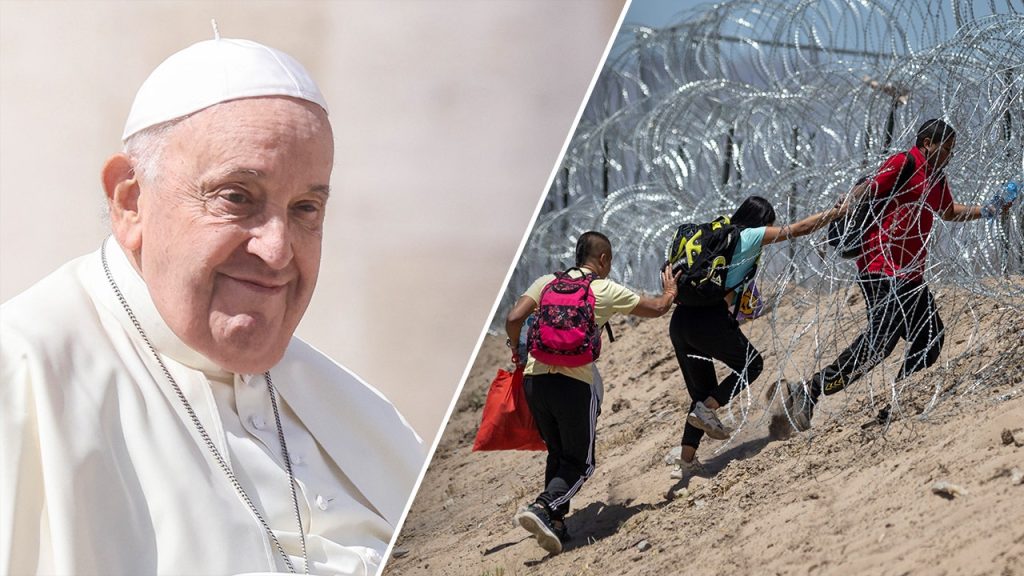Pope Francis, a staunch advocate for migrants and refugees, has reiterated his call for a more compassionate and comprehensive approach to global migration, emphasizing the need to “welcome, accompany, encourage, and integrate” those seeking refuge and better lives. He grounds his appeal in the Gospel, highlighting the moral imperative to extend kindness and support to the most vulnerable, particularly those displaced by conflict, poverty, and persecution. The Pope’s message comes at a time when unprecedented levels of migration are straining resources and testing the political will of nations across the globe, particularly in Europe and the United States, sparking intense debates about border security, national identity, and the economic and social implications of large-scale immigration.
The pontiff directly addressed the criticisms often leveled against migrants and those assisting them, denouncing those who “observe things, criticizing from afar,” and commending organizations like the Italian non-profit ResQ, which actively engages in rescuing migrants at sea and providing them with essential aid. He specifically acknowledged the perilous journeys undertaken by many migrants, highlighting the risks of exploitation, abuse, and even enslavement they face while seeking safety and opportunity. The Pope’s message underscores the inherent human dignity of migrants, regardless of their legal status, and challenges the dehumanizing narratives often associated with them in public discourse.
Pope Francis also acknowledges the complex challenges faced by governments in managing the influx of migrants, recognizing that authorities often struggle to fully meet their responsibilities due to the sheer scale of the phenomenon. However, he emphasizes the moral obligation to prioritize the rescue and protection of those fleeing conflict and humanitarian crises, even as nations grapple with the logistical and financial burdens of providing for their needs. The Pope’s words serve as a reminder that humanitarian concerns should guide policy decisions, particularly when lives are at stake, and that international cooperation is crucial to addressing the root causes of migration and creating pathways for safe and legal migration.
The unprecedented levels of migration, particularly during the Biden administration, with estimates exceeding 8 million people, have placed immense strain on federal, state, and local resources in the United States. The cost of providing shelter, food, and other services to migrants, exemplified by New York City’s expenditure of nearly $5 billion in a single fiscal year, has fueled heated debates about the economic sustainability of current immigration policies. These financial pressures often clash with humanitarian concerns, creating a complex dilemma for policymakers navigating the competing demands of budgetary constraints and ethical obligations to vulnerable populations.
The Pope’s consistent advocacy for migrants and refugees has been expressed through various initiatives and pronouncements. He has praised programs like the “humanitarian corridors” established by Catholic and other religious organizations, which facilitate the safe and legal passage of refugees into Europe. These initiatives, which have assisted thousands of asylum seekers, offer a model for collaborative efforts between faith-based organizations and governments to address the migration crisis in a humane and orderly manner. Pope Francis has also emphasized the importance of international cooperation and the need for comprehensive solutions that address the root causes of forced migration, such as poverty, conflict, and persecution.
The Catholic Church’s official doctrine, as outlined in the Catechism, provides a framework for understanding the moral obligations of governments in dealing with immigration. It emphasizes the dual responsibilities of welcoming foreigners out of charity and respect for human dignity, while simultaneously securing borders and enforcing laws for the common good. This balanced approach recognizes the inherent rights of individuals to seek refuge and opportunity, while also acknowledging the legitimate concerns of states in maintaining order and protecting their citizens. The Pope’s consistent message echoes this duality, calling for a compassionate response to the plight of migrants while recognizing the complex challenges faced by governments in managing the influx of people across their borders.










